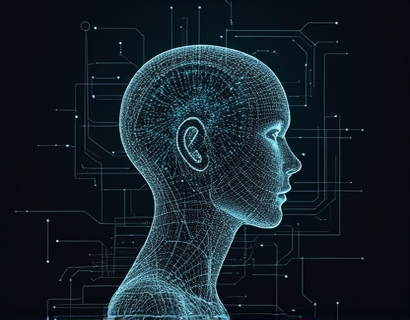Transforming Business Analytics with AI and Blockchain: A Secure and Transparent Approach to User Tracking
The integration of Artificial Intelligence (AI) and Blockchain technology is revolutionizing the field of business analytics, particularly in the realm of user tracking and behavior analysis. This fusion offers unparalleled insights into user behavior, enabling businesses to enhance engagement and make strategic decisions with confidence. The following discussion delves into how this powerful combination is reshaping the landscape of business analytics, ensuring a secure and transparent user tracking experience.
The Role of AI in Business Analytics
Artificial Intelligence has become an indispensable tool in the realm of business analytics. AI algorithms can process vast amounts of data at speeds unattainable by human analysts, identifying patterns and trends that might go unnoticed. In the context of user tracking, AI can analyze complex user behavior data to predict future actions, personalize user experiences, and optimize content delivery. Machine learning models, a subset of AI, continuously learn from new data, improving their accuracy and relevance over time.
One of the key advantages of AI in business analytics is its ability to handle unstructured data. Traditional analytics methods often struggle with data that lacks a predefined structure, such as social media posts, customer reviews, and multimedia content. AI algorithms, however, can extract meaningful insights from these sources, providing a more comprehensive view of user behavior and preferences.
Blockchain: Ensuring Security and Transparency
While AI offers powerful analytical capabilities, the security and integrity of user data remain paramount concerns. This is where Blockchain technology steps in, providing a robust framework for secure and transparent data management. Blockchain's decentralized and immutable nature ensures that once data is recorded, it cannot be altered or deleted without consensus from the network. This feature is particularly valuable in user tracking, where data privacy and integrity are critical.
Blockchain can be used to create a tamper-proof ledger of user interactions, ensuring that data is accurate and trustworthy. Each transaction or user action can be recorded as a block in the chain, with cryptographic hashes linking them securely. This not only prevents data tampering but also provides an auditable trail, enhancing accountability and trust among stakeholders.
Combining AI and Blockchain for Enhanced User Tracking
The synergy between AI and Blockchain creates a powerful solution for business analytics. By leveraging AI for data analysis and Blockchain for secure data storage and management, businesses can achieve a level of insight and trust that was previously unattainable. This combination allows for real-time, accurate tracking of user behavior while maintaining the highest standards of data security and privacy.
For instance, AI can process and analyze user interaction data in real-time, identifying patterns and anomalies. This data can then be securely stored on a Blockchain, ensuring that it remains intact and verifiable. Businesses can use these insights to personalize user experiences, optimize marketing campaigns, and improve product offerings, all while ensuring that user data is protected.
Real-World Applications
Several industries have already begun to harness the potential of AI and Blockchain in user tracking and analytics. In the e-commerce sector, for example, retailers can use AI to analyze customer browsing and purchasing patterns, while Blockchain ensures that this data is securely stored and transparently managed. This enables targeted marketing and personalized recommendations without compromising user privacy.
In the financial services industry, AI and Blockchain can enhance fraud detection and compliance monitoring. By analyzing transaction patterns and storing relevant data on a Blockchain, financial institutions can quickly identify suspicious activities and ensure regulatory compliance. This not only improves security but also builds customer trust.
Benefits of AI and Blockchain in Business Analytics
The combination of AI and Blockchain offers numerous benefits for businesses engaging in user tracking and analytics:
- Enhanced Security: Blockchain's immutable ledger ensures that user data is secure and tamper-proof, reducing the risk of data breaches and unauthorized access.
- Transparency: All transactions and data entries are recorded and verifiable, providing a clear and transparent audit trail. This builds trust among users and stakeholders.
- Improved Accuracy: AI algorithms can process and analyze large datasets with high precision, uncovering insights that might be missed by human analysts.
- Real-Time Insights: AI can provide real-time analytics, enabling businesses to respond quickly to changing user behaviors and market conditions.
- Personalization: By understanding user preferences and behaviors, businesses can deliver personalized experiences, increasing engagement and customer satisfaction.
Challenges and Considerations
While the integration of AI and Blockchain offers significant advantages, there are also challenges and considerations to keep in mind:
First, the technical complexity of implementing these technologies can be a barrier for some businesses. Developing a robust system that seamlessly integrates AI and Blockchain requires expertise in both domains. Companies may need to invest in training or hire specialized talent to overcome this challenge.
Second, the scalability of Blockchain solutions is a concern. While Blockchain is known for its security, it can be slower and less scalable compared to traditional databases. However, advancements in Blockchain technology, such as sharding and layer 2 solutions, are addressing these issues, making it more viable for large-scale applications.
Third, regulatory compliance is an important consideration. As data privacy laws like GDPR become more stringent, businesses must ensure that their AI and Blockchain solutions comply with these regulations. This includes obtaining user consent for data collection and providing mechanisms for users to access and manage their data.
Future Trends and Innovations
The future of AI and Blockchain in business analytics is promising, with several trends and innovations on the horizon:
1. Decentralized Analytics Platforms: The development of decentralized analytics platforms that leverage Blockchain can further enhance data privacy and security. These platforms allow multiple parties to collaborate on data analysis without central control, fostering trust and collaboration.
2. Quantum Computing Integration: As quantum computing advances, it could significantly enhance the capabilities of AI algorithms, enabling even more complex and accurate analyses. Combining quantum computing with Blockchain could lead to breakthroughs in data processing and security.
3. Enhanced User Control: Future solutions may focus on giving users more control over their data, allowing them to manage consent and data sharing preferences more granularly. This aligns with growing user demands for privacy and data ownership.
4. Interoperability Standards: Standardization efforts to ensure interoperability between different AI and Blockchain systems will facilitate broader adoption and integration. This will enable seamless data sharing and collaboration across various platforms and industries.
Conclusion
The fusion of AI and Blockchain is transforming business analytics by providing secure, transparent, and insightful user tracking solutions. By leveraging the strengths of both technologies, businesses can gain deep insights into user behavior, enhance engagement, and make data-driven decisions with confidence. As these technologies continue to evolve, the potential for innovation and improvement in business analytics is vast, paving the way for a more secure and transparent digital future.




































